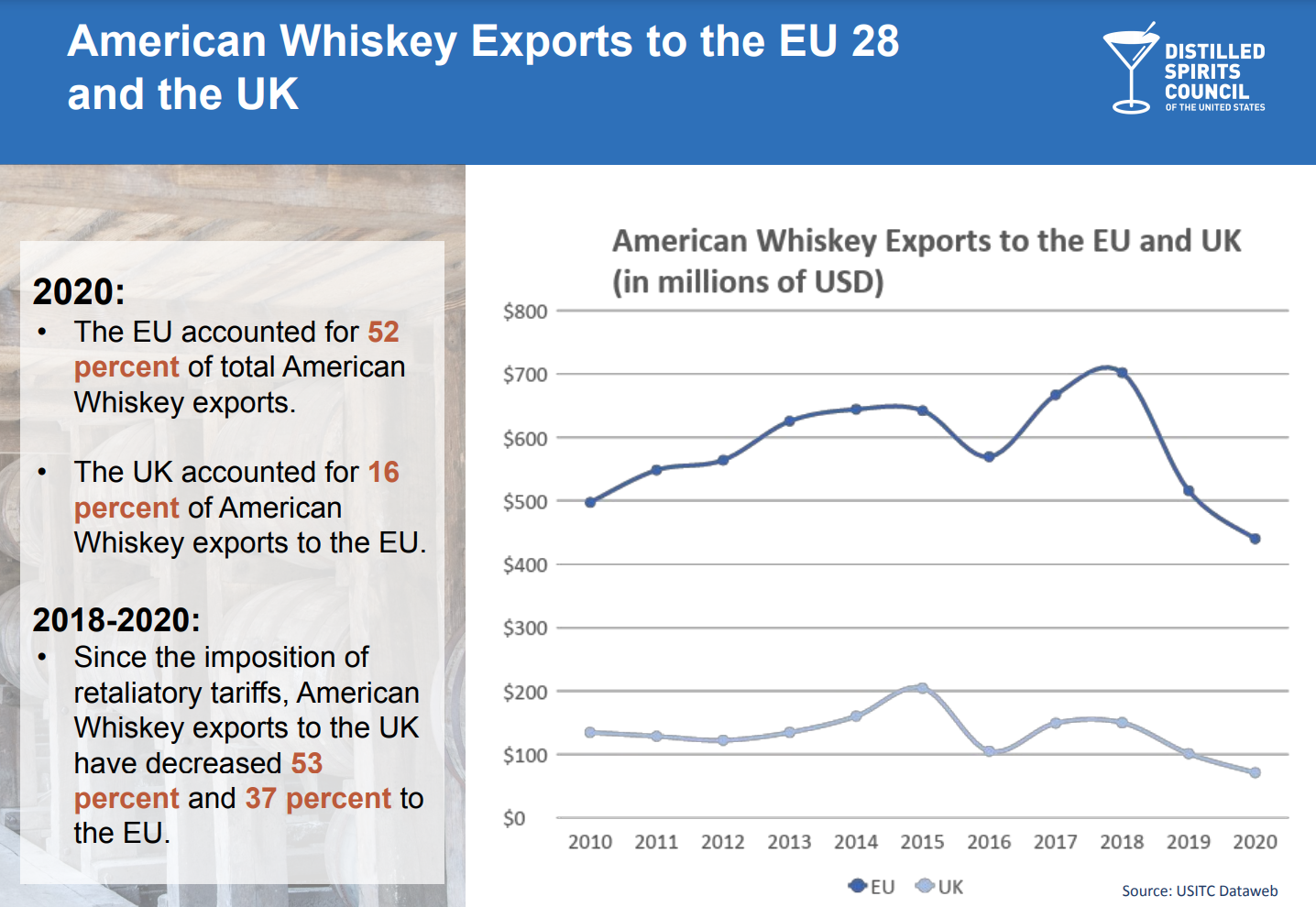After a decadelong dream by Amir Peay to revive and relaunch historic James E. Pepper Distilling Co. in Lexington, Kentucky, the brand dating back to the American Revolution had exploded not just in U.S. markets when former President Donald Trump took office but also overseas.
“We were growing really fast,” said Peay. By 2018, European sales accounted for 10% of his bottom line, and he set a goal of 20%. “We invested a lot of time and money and effort to grow in 2018, and we had no reason to think we wouldn’t. I mean, American whiskey was growing,” he said.
About 400 miles north in Chicago, Sonat Birnecker Hart, the president of Koval Distillery, was making similar plans to boost European sales past 30% with sales trips and promotion.
“We loved going abroad and talking about using Lake Michigan water and talking about Chicago and talking about the farmers in the Midwest and our products,” she said. “That’s a form of diplomacy.”
Outside Washington, in Purcellville, Virginia, Catoctin Creek Distillery was thinking the same thing. “We were seeing a lot more U.S. side competition and thought that, you know, exporting might be an interesting way to expand,” said Scott Harris, who started the distillery with his wife Becky in 2009. International sales hit 11% overall, and they set a goal of 25%.
Then Trump and the European Union opened a trade war over steel, aluminum, and Boeing-Airbus subsidies. In a bid to get Trump to back down, the EU announced a retaliatory 25% tariff on American whiskey, and hopeful Trump allies and Kentucky Sens. Mitch McConnell and Rand Paul would get involved.

It didn’t work. The tariff was imposed, and U.S. sales dropped nearly 40%. Craft distillers such as Koval and Pepper ate some of the costs to remain on European shelves and stay competitive with bigger American whiskeys such as Jack Daniels.
But now, that tax is set to jump to 50% on June 1, and many see leaving Europe and the United Kingdom. “A 50% tariff would be the nail in the coffin,” said Peay, whose distillery makes an award-winning rye called 1776.
Added Hart, who said it takes years to build up a foreign audience: “That essentially just wipes out the European market.”
Said Harris, “What happened, of course, as the tariffs came, all that revenue went to zero.”
The Biden administration is scrambling to help. “I want you to know that I think a lot about this, and we are working on this,” Biden trade czar Katherine Chi Tai told a Senate committee last month.
But it’s easier said than done.
“It’s a little bit like trying to unravel a snake. You’ve got two long-standing complex trade disputes not even related to our industry that we need the Biden administration’s support to help get us back to zero [tariffs] and unravel these tariffs,” said Chris Swonger, president of the Distilled Spirits Council of the United States, the industry lobbying group.
His goal is the pre-Trump lack of any whiskey tariff on either side of the Atlantic. “It will be an utter disaster for a great American success story. So we’re trying to do all we can to support the Biden administration in close collaboration with our European and U.K. counterparts to get these issues resolved so we can get back to zero for zero tariffs,” he said.
There has been a moderation of the trans-Atlantic fight over Boeing and Airbus subsidies but not steel, key to the whiskey tariff.
Swonger said he sees hopeful signs. “We are confident that the Biden administration is doing everything that it can to unravel the mess that they inherited,” he said.
Peay said he’s not so sure. He said the trade war “temperature doesn’t seem to be coming down.” He added, “I think they’re all trying to work on the Boeing-Airbus thing, but I’ve heard nothing about the steel and aluminum case, and that’s the tranche we’re in. So, if I don’t hear anything about steel and aluminum, how can I have any confidence that that’s going to come off?”
In the meantime, an industry already hit when COVID-19 restrictions shut down tasting rooms is hopeful that U.S. sales continue to grow and cover the loss of overseas markets.
“You know,” said Michael Langan, who heads Yellow Rose Distilling of Houston, Texas, “we’re just doing the best we can to hang on here and get through the worst of it.”
Asked if it helps that Biden isn’t a teetotaler like Trump, Langan said, “I certainly don’t think it hurts.”
But, he said, “at the end of the day, though, the thing for me is more concerning to me is that he understands how it affects the businesses and people involved in it. I have guys who it’s how they support their families.” And, he added, “That’s the thing, honestly, I’m more concerned about than whether or not the president is going to pick up an old fashioned.”
